The Eighth Samurai: An Interview with Author T.C. Rypel
Back in the 1970s and 1980s, many authors were churning out their own versions of big, iron-muscled barbarian heroes like Conan of Cimmeria. There were exceptions, of course, like Michael Moorcock, Fritz Leiber, and Jack Vance, to name three authors I’ve always favored. But then along came T.C. Rypel, who hit the ground running with something different, something uniquely his own . . . his character of Sabatake Gonji-no-Sadowara, the half Scandinavian and half Japanese samurai. Gonji was truly a breath of fresh air in the genre of Sword and Sorcery, although I think Rypel’s novel are much more epic and actually closer to Heroic Fantasy in scope and theme. His setting wasn’t some imaginary world filled with ancient gods, powerful warlocks and fanciful kingdoms, but was instead deeply rooted in and around Romania and the Carpathian Mountains of 16th century. Perhaps a parallel world, but close enough to the Europe of that era to lend it a flavor of historical reality. Besides the non-barbaric character of Gonji, who was introspective, poetic, and humble, as well as a total bad ass with a sly sense of humor, what also set Rypel’s novels apart from so many others was the fact that he worked gunpowder and firearms into his stories, right along with the sorcery and creatures and other elements of the fantastic. And like Robert E Howard’s Solomon Kane before him, Rypel made it all work, too.
— from my Amazon review of T.C. Rypel’s Dark Ventures.
I knew of Ted and Gonji back in the 1980s, when I first read his Deathwind Trilogy, when it was originally published by Zebra Books. Then I broke away from reading fantasy for a while and never knew that he followed that up with two more volumes. Sometime in the 1990s a mutual friend “introduced” us, and we shared a few letters, discussing writing and music and movies. Then I revisited the Deathwind Trilogy, and finally read volumes four and five. When we connected via the internet, emails, and later Facebook, Ted and I got to know each other very well. He enjoyed my tales of Dorgo the Dowser and played a key role in helping me shape the six novellas in the first Mad Shadows volume, and helped again with Mad Shadows II — which is why I dedicated the book to him. No one writes like Ted; he is a walking dictionary and Thesaurus, for one, and he knows how to tell a story. He is also a great editor, having a gift for character insight, plotting, and drama that have been of great help to me. And whenever anyone praises my battle scenes, I tell them, “I owe it all to Ted.” He taught me how to write those scenes from the “inside of a character’s head.” That’s the only way I can put it. If you’ve read any of his books, you know how well he handles character, drama, humor, and dialogue, as well as writing some of the most exciting battle scenes set down on paper. Although we have never met in person, he is a good friend, mentor, and sensei. And now, with the Wildside Press reissues of his original five novels of Gonji, and with the recent release of a sixth volume, I thought it was time to sit down and have a little “talk with him.” It’s high time that Ted is recognized and read by a whole new and younger audience of Heroic Fantasy aficionados.
[Click the images for bigger versions.]
And so, Ted, what and who are some of your influences?
I’d have to say in all honesty that my influences, as a writer, have come from far more than literature. Every art form has “influenced” me to create — or re-create — in words and dramatic situations the myriad feelings those arts have inspired in me. Books, films, paintings, music — all have richly contributed to what I’ve funneled into the blender of storytelling, to be synthesized in my fiction.
You read a great passage of prose — Wow…that’s like a poetic incantation! How did they just do that? You hear a magnificently moving phrase of music, in any genre — Look at the SCENE that suggests in my head…the furious EMOTIONS that beg for a verbal/visual context! A powerful painting bursts out of its restraining frame and imprints on your imagination — Hey, that’s a STORY! There’s a story lurking in there, beyond the borders, aching to be told expansively. An electrifying throwaway moment in a movie — Wait! Go back to that! Where might a significant moment like that lead, skewing away from the main story…?!
And, of course, a writer is also forever glomming onto the well-known tropes and obvious themes and touchstone moments of classic works in all the art forms, seeking to filter them through our personalities. “Influences” are the creative equivalents of air and food, to a writer. We suck them in as life-supporting substances without consciously thinking about the process much.
But since your question is left dangling without some names from the literary world, I’ll list some of the many authors who have left me slack-jawed and desirous of stirring someone else’s intellect and emotions, as they did mine: Shakespeare, Dickens, Verne, Wells, James Clavell, Jim Thompson, Cornell Woolrich, Margaret Atwood, Poe, Lovecraft, Stephen King, Tolkien, Jack London, R.E. Howard, Fritz Leiber, Karl Edward Wagner — countless more. And some I could cite might not appear to be “influential” by rep. But I’ve learned that any writer is apt to insinuate him/herself into my unconscious by virtue of a well-turned phrase or a brilliant notion tossed off in their story.
What inspired you to start writing, and how long have you been writing?
Like pretty much every other writer, I suppose fascination with the power of storytelling itself moved me, as a kid. I remember concocting elaborate fantasies, with me as the protagonist — what if this? or what if that — if I were the hero? I became a pretty wild yarn-spinner, to early pen pals. Then I enjoyed some acclaim in grade school, my 5th-grade teacher relating how she had regaled the staff in their break room with things I’d written on assignment.
So early praise got the little engine started. I quickly learned, though, how hard it is to break with the inevitable copycat, derivative writing. The first fictional piece I recall turning heads with was a spoof based on the vintage TV show 77 Sunset Strip. And ten years later, trying to write salable fiction, I was still trying to shuck the heavy influence of stories I admired, only by then it had become Lovecraft. My earliest fictional efforts took the usual path of trying to pass along the powerful dramatic feelings inspired by a great story, the shock-beats. And the least-resistance short circuit to achieving that is to almost blindly copy the frameworks and rhythms of other people’s published works.
“Blindly” is the operative word. It’s weird how you can go on for a while not even noticing you’re doing that. Later on, you learn to evoke the emotions and spring the surprises on your own terms, without directly cribbing from others.
What genres and/or literary style do enjoy writing in the most?
Well, I’ve written work for pay, or promise of pay, or, too often, hope for pay, in various literary forms over many years. Hard to say which I enjoy the most. Heroic-fantasy fiction, or occasionally horror, seems to be the one that brings the most authentic “enjoyment” during the work-in-progress. Fiction tingles with the promise of flashing your own, completely original work (Wow — wait’ll they read THIS!), as opposed to, say…book and movie reviews, or essays on processes and such, which declaim on others’ works, or on communal experience. And because of all the books in the Gonji series, that’s where I’ve achieved most of whatever rep I can claim. So aspects of that can be termed pretty pure enjoyment.
Screenplays are a more recent endeavor — I’ve written a half-dozen — and those can be intriguing, as you begin to envision, on your mind’s screen, the playing out of your words in an audio-visual medium. And with those I’ve found a paradoxical codicil to what I said above about commenting on others’ work feeling less fulfilling: I’ve done a couple of adaptations from printed works, to which you very much bring your own storytelling sensibility, as you translate prose-for-reading into filmable form. Suddenly you feel just as important as the writer of the original source material, as its curator and translator.
But let’s face it — after the labor, when your work comes out in print, whether it’s an epic novel or a limerick, you feel some pretty valid retro-enjoyment.
Tell us about your latest published book, short story or novella.
My latest published book is Dark Ventures, the sixth book in my heroic-fantasy Gonji series. Gonji began in the 1980s, with a series of five novels about a questing samurai of Japanese and Norwegian parentage. Originally published in mass-market paperback by Zebra Books, the novels have been reprinted by Wildside Press in paper and Kindle. Dark Ventures is the first series book featuring shorter tales and a definitive creation and publication history. My hope is to interest a new generation of fantasy readers with this easier-to-digest gateway book.
Gonji sold well in the ‘80s and stayed in print for quite a few years. Yet he’s forgotten today for reasons I detail in the “GONJI Odyssey” essay in Dark Ventures. It was a strange trip.
Besides the “entertainment factor,” what do you strive for in your writing?
Well, entertaining is #1, of course. But I do like the challenge of appealing to imaginations in new ways, if possible, rather than delivering formulae-on-demand. Edifying readers, teaching them interesting aspects of ancient or even imaginary cultures, is a respectable goal, if it’s not pushed to unwelcome limits.
But I really enjoy trying to invest my characters with irresistible, memorable qualities that render them real to the reader. Probing into human interactions in new ways; divining what otherwise ordinary characters might behave like under fantastical stresses we can’t know in our present frame of reality. There’s little more satisfying than hearing from readers about how much they’ve imprinted on certain characters in my stories. Or fretted over some character’s fate.
Not to mention the perverse delight in being taken to task for having killed off some literary sacred cow — getting your readers to take your imaginary characters that literally is a heady taste of pseudo-godlike power!
Would you say that your stories are more plot-driven or character-driven?
Well, there’s a common and very valid question that comes up a lot in interviews. Readers are one step ahead of you on this one: they know what you’re going to say. Most writers will reflexively take the literary smart-guy stance and proclaim that character is everything to them. And I’ve already stated above how important it is to me to create characters the reader deeply buys into and identifies with.
But I’ll take a slightly devil’s-advocate position here. Naturally if no one cares about your characters, their actions and fates will be irrelevant. But I think the truth is subtler than the either/or proposition implied in the question. Great characters — lived-in characters, humanly (or alien-ly) accessible entities, and not larger-than-life but rather larger-than-circumstances players — live on in memory and legend and myth. That’s a given. Yet in fiction one of the promised compacts to the reader is that these characters will engage in significant actions. The more refreshingly new and exhilarating to read about, the better. That’s a function of plot.
To be sure, plot grows out of a character’s choices, when done most successfully. But once those character-driven responses to a plot catalyst are seeded into the story, the branching outgrowths of plot begin to propel what’s possible for the characters to do. The pulps, at their best, were probably plot-driven. But that’s why so very many pulp characters are still memorable. They were imagined as role-players who’d become durable, repeatable plot functionaries with personal stories so gripping that the readers would happily overlook the fact that…ten Doc Savages couldn’t possibly have had 180 adventures like that in one lifetime. But as a fan you didn’t care! Doc and his mates were compelling characters. They didn’t grow much, in terms of evolving human lives. But you simply didn’t care. They were a fun band of heroes, dropped into plots that transported you into exotic realms of fantasy terror.
But that’s all a lot of general speculation on this classic writer question. I think most writers at least unconsciously set out to create a balance of both character and plot. The fact of which element sparked your interest in writing a particular story doesn’t really matter. In the case of the Gonji series, I was playing around in my notes with some character ideas for a few years. Then the big background story arc for the books came together. And suddenly those characters fit. I dropped them into the maze. Their responses to their struggles to find their way through it, based on the personalities, histories and physical traits I’d given them, never ceased to fascinate me, changing things, creating unanticipated new plot threads…
Their evolution, as dynamic characters altered by time and circumstance, became its own plot engine, in turn changing plot possibilities. So at least in the case of the Gonji series, despite the wide range of wild actions, giant-monster incursion and inter-dimensional madness, I’d have to say that character slightly edged out pure plotting.
“What will come out of THIS horrifying madness?” kind of took slightly second fiddle to “Wait ‘til they see THAT character’s reveal!”
What can you tell us about your latest work(s) in progress?
There’s a long-promised Gonji origin novel coming at some point from Wildside Press. Titled Born of Flame and Steel, it’s previewed at the end of Dark Ventures with a long excerpt. The one and only series book actually set in the alt-history 16th-century Japan that Gonji — the “sword-arm of Destiny” — will be born into, that ambitious book deals with an apparent apocalyptic event in which Japan is ground zero. Welcome to your cosmos, kid!
Gonji’s future parents — young samurai warlord Todohiro and the shipwrecked neo-Viking shield maiden they call “Lady Hel” — are thrown together during a cataclysmic, monster-warring, multi-verse event. They’re a trip, those two. It’s not exactly your typical “meet-cute” romance.
In what direction do you think your work is now heading?
Hard to say. At my age I don’t set career goals anymore. I go with the flow. In recent years friends in the film industry have come to me repeatedly with script requests. So I’ve written those half-dozen feature-film screenplays, none of which has been produced as yet. Sometimes I’m asked for the occasional non-fiction piece, like the book intro chapter I wrote for The Outer Limits at 50 (for which I was able to proudly share in a Rondo Hatton Classic Horror Award for “Book of the Year”). And I still do some editing, proofreading and blogging work.
But I suppose if there’s a discrete focus on a nagging, unfinished goal, it would be to write the three novels that would bring Gonji’s questing life to a satisfying closure. Demand doesn’t seem to warrant that right now. And my agent sees no traction in marketing more Gonji in the traditional publishing arena, where the series began in the ‘80s. So I’m not sure how much energy I can summon to take on these big books — though they’re completely outlined and partially written — for little more than the satisfaction of completing the series’ background arc.
But if your question implies is my work getting any better? Hah! Thanks for at least leaving me an argumentative option! I’ll abstain and leave that judgment to the readers.
What genre of fiction have you not yet written for, but plan to in the future?
If I ever get sensible and take the purely commercial approach my agent assures me is the proper goal for a true writing pro, I’ll let you know. Sensibly following a recommended course of action has never been my cup of cha.
Name a few of your favorite literary characters and tell us why they are your favorites.
This question makes my head spin. There are too many answers. And most of them would be considered common, merely checked-off boxes on a literary menu most writers, in heroic-fantasy at least, would nod to as a given. I’ll skip those.
But if there are a few character tropes I lean toward…I’d have to give cursory credit to strong, resourceful types who are huge overcomers, which can render them hauntingly lonesome. Not necessarily loners, of the common Hollywood-film type. Gonji can sometimes yearn for the company of sword-kinsmen and friends and lovers in my books, and wax guilt-ridden over the fates of many of them: being a great warrior doesn’t exempt one from a full range of chaotic human emotion. So I’m attracted to dynamic, driven characters with massive and tormenting agendas.
And I love the character of the common person who’s uprooted from his simple life by sudden upheaval and forced to come to grips with his capacity to survive. Some make it, some don’t, some fake it; all are revelatory of human strengths and weaknesses and foibles.
What are some of your all-time favorite films and TV shows?
Well, my TV tastes are far-reaching and eclectic. I obviously prefer the fantasy and science-fiction genres. Name the classic sf TV shows, and I probably find a lot to like in any of them. But since my passion for the original Outer Limits led me to create the first dedicated appreciation for the show, back in the late ‘70s (The Outer Limits: An Illustrated Review), I of course prefer that as my all-time favorite by a wide margin.
As for films, again I’ve written extensively about the field. My earliest pro sales were film reviews. Film is probably equally as important as literature to me. And my favorites list is wildly varied, and time- and genre-hopping. My top favorite director and film are Akira Kurosawa and his 1954 classic THE SEVEN SAMURAI. I love the heroic, and no film plainly deals with the simple heroism of the strong morally obligated to help the weak, or the sheer panoply of human emotions when violent adversity strikes, as that epic does, in my consciousness.
As for a list of films that fall into line behind SEVEN SAMURAI…? It would be massive, and it’s endlessly mutable. I hate those lists and rarely engage in them. But I’ll randomly spew a bunch of them right here, in no particular order, as a stream-of-consciousness exercise: THE SEVENTH SEAL… KING KONG (1933)… METROPOLIS (1926)… CITY LIGHTS… FANTASIA… THE WILD BUNCH… PULP FICTION… RUN, LOLA, RUN… JASON AND THE ARGONAUTS… HARA-KIRI (1962)… 300… ALIEN (and its first sequel, which are hard to separate, as an intense, ongoing narrative)… CYRANO DE BERGERAC (1950)… Jackson’s LORD OF THE RINGS trilogy — I never thought anyone could pull off an adaptation as well as he did… THE DAY THE EARTH STOOD STILL… DUCK SOUP… BREAKER MORANT… THE GENERAL… KWAIDAN… ONIBABA… PREDATOR… DOUBLE INDEMNITY… enough! I might as well just photograph my dvd/laserdisc/VHS shelves, bulging with well over a thousand units, and post that!
Tell us about your writing habits, such as: Do you outline extensively? Do you create your characters first, or your plot? Do you listen to music while writing, and if so, what kind?
I rarely listen to music while working. But I do outline obsessively. I’m a control freak; I have to know where the story is going before I’ll invest what I know will be a yeoman’s labors — I write mostly long forms, remember. So I outline longhand, then break the outline down in more fragmentary detail on index cards carrying: every planned scene, like storyboards; all the characters; key research details; and important dialogue. (I’m always hearing dialogue exchanges in my head that I don’t want to forget, once the characters come alive in my brain and battle for screen time!)
These elements get largely embedded into the work, but often details are abandoned or altered on the fly as the much-cited process of “organic” story development takes on a free-form control of its own. Never undervalue the power of spontaneous creativity. But without the confidence of a cohesive framework to begin with, I couldn’t get far enough into it for wild inspiration to harvest what I’ve prepped and run with it into fascinating new dark alleys.
But I’m always open to changes and evolutions in my process; nothing remains static.
For instance, when I was writing the anchor novella of the new Gonji book, “Dark Venture,” it had been commissioned for an anthology of new tales about fantasy heroes who had become popular in the 1970s and ‘80s (which hasn’t appeared yet: I pulled my story for my own book). I knew this would be an important Gonji story in that it might help draw a new generation of readers into the re-issued series novels. So I was really stressed about it. I found that I was taking such copious longhand notes — somehow fearful of starting into the first draft proper as if there were some sort of mystical barrier deflecting me — that I was writing large, disjointed chunks of the story longhand.
So I broke through that block by simply taking all my longhand prep material and typing it right into the story’s Word.doc, in sequential story order. In essence, I spewed all those countless notes onto the manuscript. instead of having to refer to them, back and forth, throughout the writing of the story: my notes physically evolved into the completed story. That was the sloppiest, most incomplete first draft you ever saw! But that got me past the flop-sweat blockage and into some story clay that I could properly knead into shape, adding text and deleting junk notes from the manuscript as I proceeded.
There’s no be-all and end-all process I’m unwilling to jettison in the name of getting the work done.
Then, when I was asked by an indie producer to try my hand at the first of the feature-film screenplays I’ve written, I found that right out of the gate I was more comfortable with writing the entire first draft longhand, on yellow legal pads, and then typing that draft into the Final Draft software program I use for scripts. From there I rewrite in the conventional way. That’s become my screenwriting process, every time. I’ve even learned to space out all my dialogue and stage directions on the longhand draft in such a way that I can predict how many pages of proper script my longhand will translate into, within a page or two of the final result in the formal draft doc.
So… I guess sometimes a plain sheet of paper under my pen-scribbling hand still works better for me than a foreboding blank doc above a mocking keyboard. There’s just no end to what you keep learning about even the simple mechanics of your creative process. I think there’s a cackling madman somewhere in your mind who’s in charge of all your creative tools.
What else can you tell us about yourself and your reading habits?
In recent years I’ve found I’m enjoying reading fiction less than non-fiction. And when I read fiction, I’m seeking out more short stories now, whereas I used to be more fond of novels. Probably why I immediately gravitated toward writing them. But fewer novels seem as appealing as they once did, and I abandon more, unfinished, than I used to allow myself.
As for myself…I dunno. As I age I guess I’m getting crankier and more pessimistic. I can’t say I’m down skippy with this new populist publishing model that forces you to become a marketing expert and an Internet promotional whiz, if you’re dwelling on niche markets and writing genre offshoots that can only be placed with smallish, indie publishing houses. I tend to be old school. I got spoiled seeing my books in actual bookstores and on drugstore spinner racks, back in the glory days. That’s a tough socio-professional dynamic to shake off. I dropped out of writing altogether for several years, in a snarly despair, after original publisher Zebra Books dropped its entire fantasy line. I was unable to get any new projects past my own agent. So when I was finally persuaded that there was some Gonji interest beckoning me back into publishing, I even came to the cyber-world rather late. I had to learn all these new machinations on the fly, never quite becoming comfortable with the way things are.
There always remains the specter of going back to the traditional publishing world. I’m still engaged with my longtime agent. But the traditional publishers are so wrapped up in commercial trends that I’ve always resisted the approaches she’s suggested. She likes to market apples, and I stubbornly keep growing oranges. But I don’t have the energy to go through an agent search again. So we stay together. I’m an old warhorse from her original stable; she keeps me around for sentimental reasons, and to broker the very occasional contract I bring her for resurrected old work.
Did you always want to write fantasy/action/adventure?
Sure, right from the get-go. I wanted to emulate all the fantastic stories pop culture kept un-scrolling from that fabulous tapestry you discover awaits your feverish attentions, as a little monster-kid! I wanted to be Superman and Zorro and all the heroes of sf and fantasy I watched and read about.
Tell us about your childhood and how that plays into your writing.
My childhood was a fertile proving ground for a young storyteller. I can recall every watershed moment that led me to a passion to write professionally. I loved books and movies from the moment I became cognizant of their narrative power. They inspired me to fantasize endlessly about making possibilities of the impossible. I wanted to see every monster movie ever made. I learned to read from the comic books my mom indulged me as a preschooler. My parents were readers, so I had encouragement.
The superhero and monster books were terrific, of course, but I developed an instant fondness for the heady promise of greater knowledge of timeless storytelling, through the wonderful Classics Illustrated. My parents took note of that, and when I was 10 they bought me the finest Christmas present I ever had: a 12-volume, hardcover collection of abridged-for-juveniles editions of some of the classics of literature. I still own that J.J. Little & Ives set of 25 novels, ranging from Moby Dick through Verne, Dickens, Twain, the Brontes, et al that ordained me as a young minister of the enduring power of books.
Add that to the earlier experience I’d had at age 6 — I’ve written about this many times — of seeing the great King Kong on a big theater screen during a national re-release and stumbling out at the end, slack-jawed and glassy-eyed, gently led away by my movie-loving uncle as I kept gazing back at that mesmerizing screen that had just shown me what storytelling heaven looked like.
I knew all these marvelous cultural experiences were simply too good to do nothing about but stare at them passively, trying to suppress all those roiling emotions they evoked. I had to be part of that storytelling scene, somehow.
And friends… I was that lucky kid who was able to gather around himself a cadre of like-minded book-and-movie fanatics, many of whom are among my closest friends to this day. We’re still bound by codes of shared enthusiasms that may have evolved but have never cast off the ties to the formative experiences. (And that, folks, is one rationale for the undiminished, fiery passion for so-called pop-cultural “junk” — like low-grade B-movies — that allows you the cognitive dissonance to both laugh at their naïve shortcomings and defend their honor as earnest efforts at entertainment, accusations of cynical profiteering be damned.)
We had the books, the movies, the comics… and around the time we were just becoming sophisticated enough for more visceral, “adult” storytelling — lo and behold! — the pulp revival in mass-market paperback was upon us: Doc Savage, Lovecraft, Howard, Leiber and all their ilk…
To paraphrase Ray Harryhausen’s often-repeated statement in interviews about his first experience of Kong, “we haven’t been the same since.”
Besides your legacy character, Sabatake Gonji, which of your characters do you find the most fascinating?
Killer question. Kind of a trap. You know, you’re like a parent being asked which of your kids you prefer over the others.
The Gonji series afforded me the opportunity to imagine a number of characters I take pride in. In a series with an ongoing epic narrative arc, you need to richly embroider your characters. You need to make sure readers will care about their resolutions, cheer for their triumphs and mourn their tragedies. The only way to try to assure that is to make them so seemingly real that you find it personally painful should you have to sacrifice them; and you pump your fist when they squeak through to survival, as if, weirdly, you didn’t know what was going to happen yourself.
In that context, I could reel off a bunch of characters from the “Deathwind Trilogy,” especially. I spent several years creating and refining that long tale. But of course I’m very attached to Gonji’s reluctant ally, the tormented werewolf Simon Sardonis. Many readers have bugged me over the years to write some standalone Gonji & Simon stories. That’s on my bucket list. Simon’s pretty unique among his lycanthropic peers, I think, as a reluctant, heroic werewolf (with an enormous axe and broadsword).
But I also have a special fondness for the trilogy’s antagonist, King Klann the Invincible. Now that’s one of my more original and complex characters, I believe — the wandering, deposed king created, during a flight from usurpers, by a court wizard who combined frail, dying, newborn septets into one child that harbors the future lives of all the individual infants. With each death, a distinct new life emerges. And they’re all different, physically, temperamentally…
That was a pretty wild character(s) to play with. And their dramatic resolution, in the books, is far from over. That’s all I can say.
But others have also found Klann haunting. One of my Hollywood VFX pals, who runs his own small production company when he’s not working for others, shares my pipedream of a wouldn’t-it-be-amazing Gonji movie. But just a few months ago, he began talking about a different tack: adapting the bizarre character of King Klann to pitch to investors as a movie. It was eye-opening and flattering, of course. But there’s a sobering reason why it couldn’t be done without compromising the finishing of the Gonji novel arc — and dammit, I can’t say why without springing a major spoiler!
So if I die first and the Gonji saga is left without closure… then full speed ahead with a movie focusing on King Klann the Invincible, one of my own favorite character creations!
But then… don’t get me started about David Morgan, the protagonist of my unpublished magnum opus, When Next He Appears. My anti-Potter magnum opus: Harry Potter without any magic support group. That character has haunted me since I conceived him, around 1980 — well before Potter — as a young boy who begins as the only child in a contemporary troupe of real magicians who pretend to use stage-magic tricks. A devastating separation from that world would leave a 7-year-old magician floundering in some dire straits, not to mention hostility and neuroses. He can’t even trust his own memories of his weird childhood and seeks psychotherapy to get “deprogrammed,” to analyze the source of his magic abilities… and then — like I said, don’t get me started.
We writers all know that our characters secretly exist. Like David Morgan’s physics-manipulating parents, we just pretend they don’t, to keep the misunderstanding world at bay.
Here’s a little bit more information we have in Ted’s dossier….
T.C. Rypel — “Ted,” to all who admit to knowing him — is a writer who has divided most of his existence between northeast Ohio and the darker regions of his imagination. He has tilted with the fantastic, in fiction and non-fiction, in forms that generally wouldn’t surprise you — novels, film criticism, screenplays — but in some that surprise even him. (Like…34 bawdy Irish drinking-ballad stanzas for a Guinness Book of World Records endeavor.)
The Gonji series is the work for which he’s best known, chronicling the historical-fantasy, European sword-and-sorcery adventures of a demon-stalked, metaphysically questing 16th-century samurai-Viking, Gonji Sabatake. A popular series first published by Zebra Books in the 1980s, Gonji was curtailed when Zebra dropped their entire fantasy line. Now the five published books in the series have been re-issued by Wildside Press, in newly revised, authorized editions, in paper, Kindle and audio books. The books have also been translated into a German edition, with a French translation in the works. Dark Ventures, the first new book in the Gonji series in decades, has just been released by Wildside. Rypel plans to bring a long-promised closure to Gonji’s relentless quest against tyranny across monster-infested Europe and into strange and unexpected worlds beyond.
You’re welcomed to keep abreast of Gonji news and postings at the “Gonji Fictional Character” Facebook page and the “T.C. Rypel” Amazon author’s page, and to friend the author on Facebook, as “Ted Rypel.”
Ted’s Amazon Author page: www.amazon.com/T.C.-Rypel/e/B001O8K4JY
Facebook: facebook.com/ted.rypel
Official Gonji Facebook page: facebook.com/Gonji-125024384256990/
Thank you very much for the pleasure of joining you in the Mother of All Interviews, Ted. All the best to you . . . and you know I’ll be eagerly awaiting future tales of my favorite samurai.
Joe Bonadonna’s last article for Black Gate was his interview with Adrian Simmons and David Farney of Heroic Fantasy Quarterly.
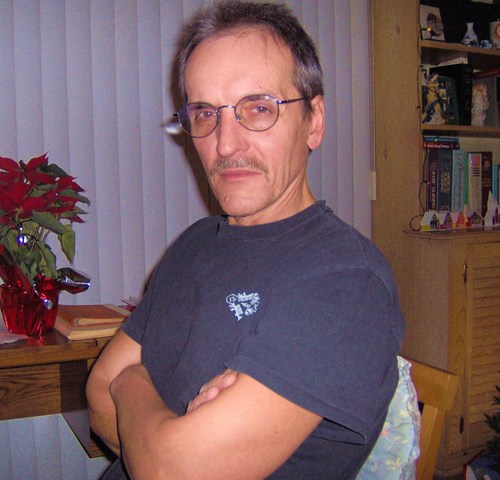
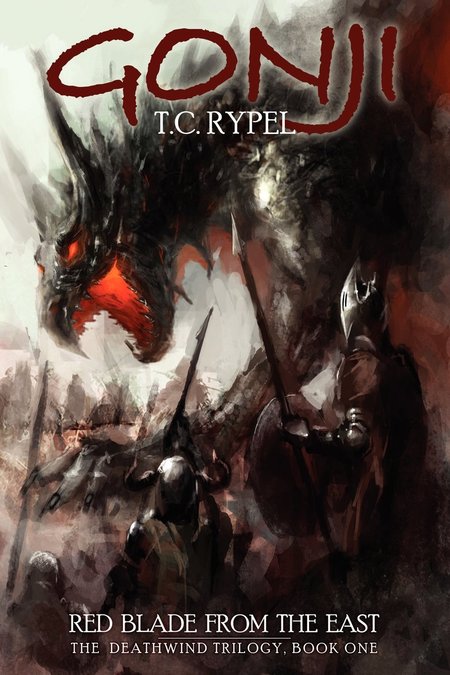
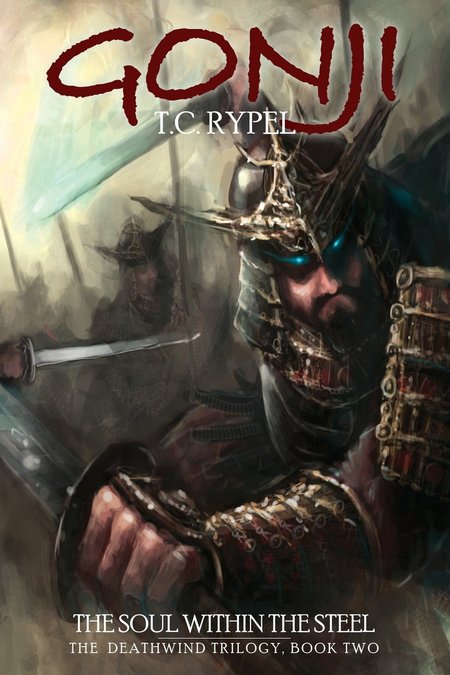
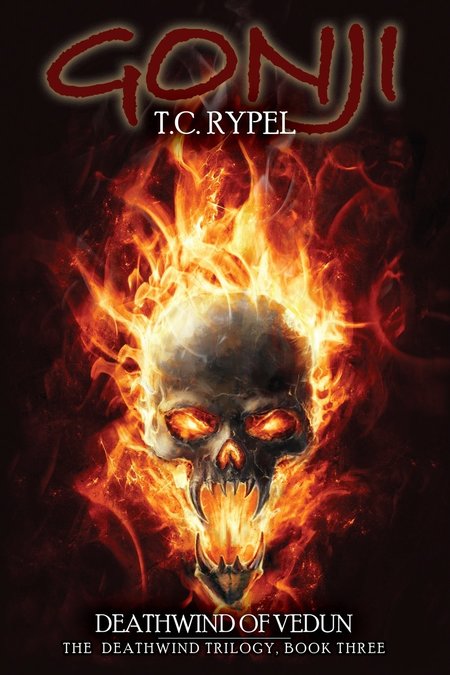
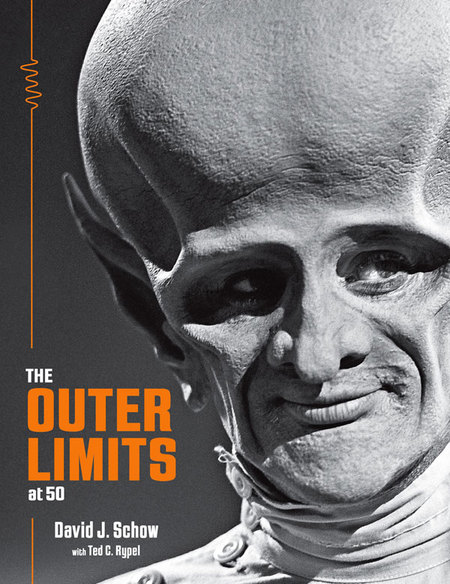
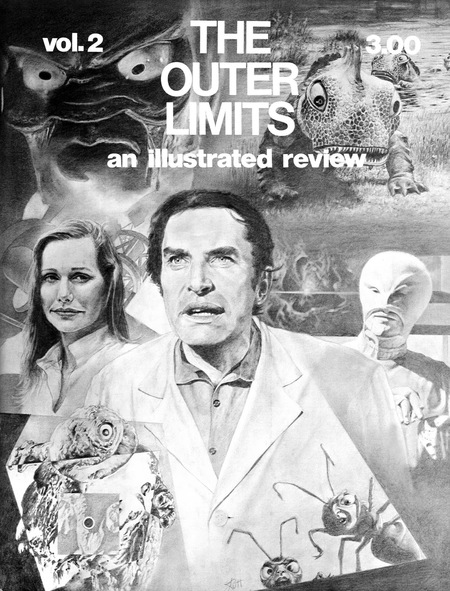
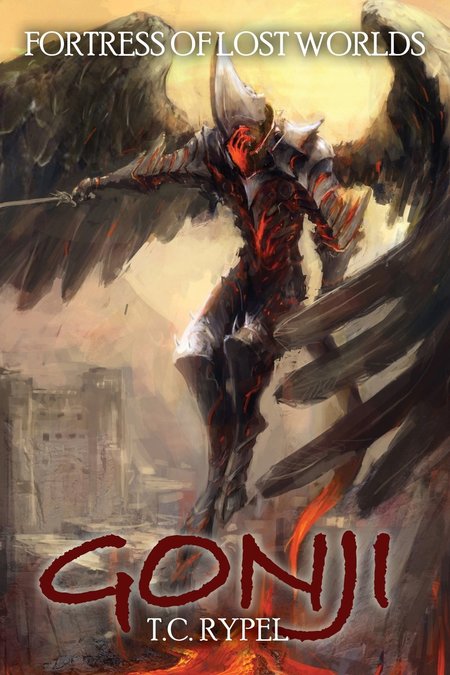
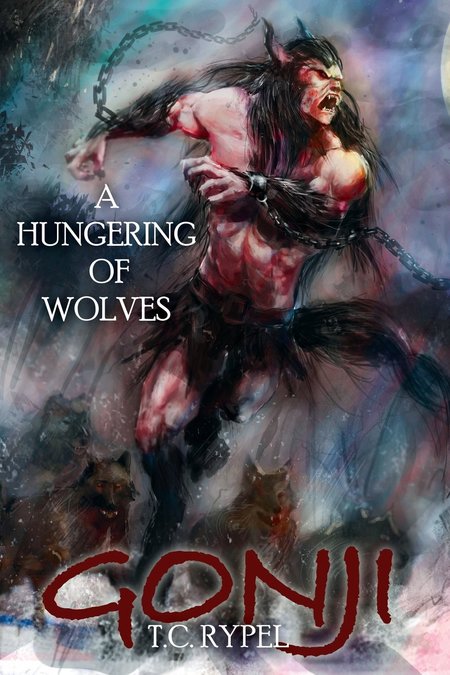
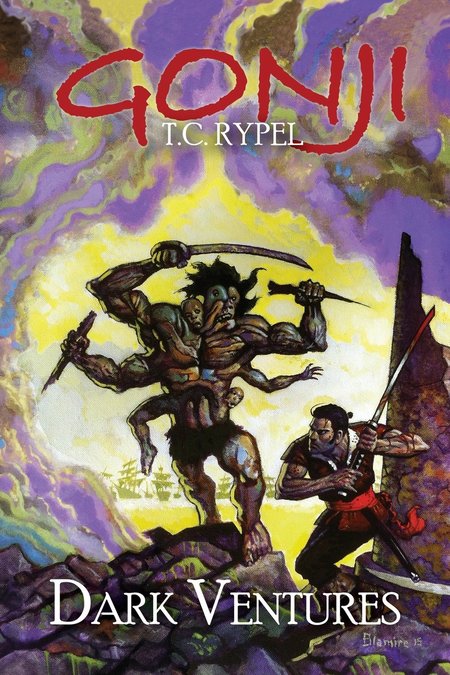
Epic interview. I have Dark Ventures in queue and need to tackle that soon. Long live Gonji (and Ted…and Klann too)
Fantastic job arranging and editing this interview, Joe. And that’s no mean feat with the way I can bloviate! Thanks to you and John O’Neill here at Black Gate for the space and time to rattle my katana.
Thanks to Seth Lindberg for the enthusiastic props. Praise from the widely read and richly accomplished Mr. Lindberg is also nothing to take lightly.
And three thanks is the charm that informs the sentiment with sincerity: So here’s a final big bow of gratitude to Joe Bonadonna again, for all those glowing remarks that give me a lot to live up to with anything else I write. Maybe I should quit while you, at least, think I’m ahead!
Domo arigato!
You’re very welcome, Ted. My pleasure, and it was great fun, too. Props and thanks once again to John O’Neil and all the Nazgul who ride forth from the Black Gate! Or fly, depending on whether or not their horses drowned that day.